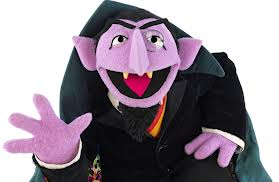
|
| Googol...Ah, ah, ah! |
You may want to say that infinity is the largest, but that's not a number. Infinity is an idea, so we can't say that it's the largest number possible. If we're talking about named numbers (like million, billion, trillion) then one of the biggest we can talk about is a googol. A googol is 1.0 x 10100 - which is a scientific way of writing a one followed by 100 zeros. Google actually chose their name as a play on "googol".
Ok, so let's get an idea for the size of a googol.
10,000,000,000,000,000,000,000,000,000,000,000,000,000,000,000,000,000,000,000,000,000,000,000,000,000,000,000,000,000,000,000,000,000
I hope you can appreciate how huge that number is. A googol is such a large number that there isn't a googol of anything in the entire universe. Even if we break down all the atoms in all the universe and counted the protons, neutrons, and electrons individually we would still fall short. So why do we even need a number as large as a googol. Well, besides the fact that googol is fun to say,1 large numbers like googol become important in statistics. Here's an example of how quickly numbers can get out of control:
Let's suppose I have two people in a line. How many different ways can we arrange them in that line? Two, right?
Let's suppose I have two people in a line. How many different ways can we arrange them in that line? Two, right?
And if I had three people there would be 6 ways to arrange them in line.
If we had 4 people there would be 24 ways and if we had 5 people there would be 120 ways.2 You can see that the numbers start getting big pretty quickly, so how long would a line have to be before there was a googol of ways we could arrange the people in the line? Surprisingly, only 70 people.3
But a googol isn't the largest named number. A googol is 1.0 x 10100 - a one followed by 100 zeros. An even bigger number is the googolplex, which is 1.0 x 10googol - a one followed by a googol of zeros.
Now, let's get an idea about the size of a googolplex.
10,000,000,000,000,000,000,000,000,000,000,000,000,000,000,000,000,000,000,000,000,000,000,000,000,000,000,000,000,000,000,000,000,000,000,000,000,000,000,000,000,000,000,000,000,000,000,000,000,000,000,000,000,000,000,000,000,000,000,000,000,000,000,000,000,000,000,000,000,000,000,000,000,000,000,000,000,000,000,000,000,000,000,000,000,000,000,000,000,000,000,000,000,000,000,000,000,000,000,000,000,000,000,000,000,000,000,000,000,000,000,000,000,000,000,000,000,000,000,000,000,000,000,000,000,000,000,000,000,000,000,000,000,000,000,000,000,000,000,000,000,000,000,000,000,000,000,000,000,000,000,000,000,000,000,000,000,000,000,000,000,000,000,000,000,000,000,000,000,000,000,000,000,000,000,000,000,000,000,000,000,000,000,000,000,000,000,000,000,000,000,000,000,000,000,000,000,000,000,000,000,000,000,000,000,000,000,000,000,000,000,000,000,000,000,000,000,000,000,000,000,000,000,000,000,000,000,000,000,000,000,000,000,000,000,000,000,000,000,000,000,000,000,000,000,000,000,000,000,000,000,000,000,000,000,000,000,000,000,000,000,000,000,000,000,000,000,000,000,000,000,000,000,000,000,000,000,000,000,000,000,000,000,000,000,000,000,000,000,000,000,000,000,000,000,000,000,000,000,000,000,000,000,000,000,000,000,000,000,000,000,000,000,000,000,000,000,000,000,000,000,000,000,000,000,000,000,000,000,000,000
Ok, let's stop there. That isn't a googolplex, it's a one followed by 1,000 zeros. It's obviously a huge number, but we haven't even gotten close to a googolplex. To write a googolplex I would need to copy and paste all the zeros in the number above 1.0 x 1097 times - that's a one followed by 97 zeros! That's a lot of ctrl-c/ctrl-v.
So, unfortunately I can't really write out a googolplex for you (and if I somehow could you could never count the zeros to check my work). In fact, even if I programmed my computer to count to a googolplex it would take so long for the program to finish that every second from the big bang until now could repeat itself 1.0 x 1087 times for the program to finish. I'm pretty sure my battery would be dead by then, though.
Notes
[1] Even more fun to say is a googol times ten, which is called a "googolty"
[2] If you're wondering about the math here: Anytime you have a certain number of objects that are all different and you want to know how many ways they can be arranged you can use factorials. A factorial is just an exclamation point after a number. 2! means 2x1. 3! means 3x2x1. 4! means 4x3x2x1. 5 people can be arranged in a line 5! ways, or, 5x4x3x2x1 = 120.
[3] Now the next time you're in a long line you'll have something to occupy your time - try imagining all the different ways you can arrange the people in line with you. If you're in a line of 20 people and can imagine one arrangement every second it will only take you 77 billion years to imagine all the possible arrangements. If you're still in line after that it may be better to come back when the DMV isn't as busy.
Edit:
If we're talking about big numbers, I should have ended with a googolplexian - 1.0 x 10googolplex - a one followed by a googolplex of zeros. I had only seen googolplexian mentioned in online forums and such, so I didn't include it. However, wolfram alpha accepts googolplexian, and that's good enough for me.



